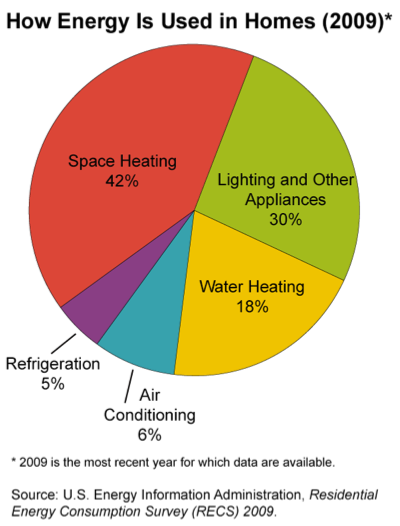There are a number of easy actions that climate- and economically-minded Americans can take to help reduce carbon emissions, shrink their environment footprint, and boost the economy on a local scale. Buildings in the U.S., including both commercial and residential spaces, account for nearly half of U.S. energy usage and carbon emissions. Making even small improvements in the energy efficiency of these buildings will result in a significant decrease in energy usage and emissions, and, fortunately, the individual consumer can make some of these energy efficiency improvements on their homes relatively inexpensively. At a minimum, homeowners can replace incandescent light bulbs with LED bulbs, which use significantly less energy and have decreased in price over the last few years—additionally, LED bulbs usually pay for themselves in energy bill savings within just a few months.
On a larger scale, companies like E3 INNOVATE conduct energy audits to determine the most cost-effective energy efficiency improvements for homeowners. Many homes, for example, will benefit immensely from installing spray foam insulation in poorly insulated attic spaces or throughout a new construction project. Heating and cooling combine to account for roughly 50% of residential energy usage; accordingly, installing better insulation will cut the homeowner’s energy bill, not to mention improve comfort and decrease carbon emissions for years to come.

Once a home has improved its efficiency and captured all of the low-hanging fruit, homeowners can further reduce their emissions by installing solar power. In some cases, particularly with Passive House designs, residential solar systems can even become net producers of electricity (now, that’s cool!). Prices for solar panels are falling and the federal government still offers a 30% tax credit for new solar installation. Payback periods for solar panels average 5 to 8 years in the United States. Though solar power represents a more long-term investment, the long-term benefits are significant both financially and environmentally. Besides helping the grass grow, solar can help grow local economies too. In mid-2016, Bloomberg News reported that the solar energy industry had added jobs at 12 times the overall U.S. rate of job creation in the past year. Additionally, the solar sector in the U.S. now employs 77% more workers than the coal mining industry.
There are many ways we can reduce emissions while shrinking our environmental footprint, and improving efficiency in your home is a great place to start. Beyond home efficiency improvements, though, we can also shop locally, buy fresh produce from neighborhood farmer’s markets, bike to work, plant trees, and carpool more regularly. All of these steps help make our air a little cleaner and our future a little brighter. Calculate your home’s carbon footprint with the EPA’s Carbon Footprint Calculator.
E3 INNOVATE serves proactive Nashville homeowners seeking to improve the comfort, health, and efficiency of their home while setting a local example.









